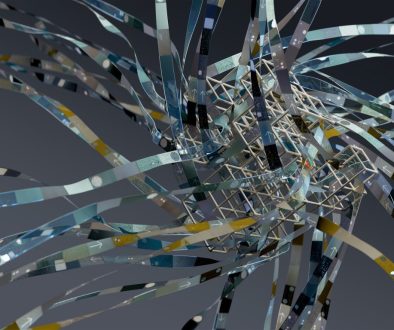Proof, Episode 2: Potential?
[Editor’s Note: Read the entire story from the beginning!]
On his way home, Tucky stopped off for a pepperoni pie at Snappy Tomato. He figured he’d zone out with a six pack of Nitro Porter and a Hobbit move. As a plan for the evening, it was a poor substitute for what he really wanted after breaking up with Carla: a chance to talk out his hurt feelings with Mom or Dad.
Trouble was, he’d never met either of them. His name was a mishmash of data from the police report to Social Services: They’d found him inside a gas station washroom along Route 54 in Calloway County, Kentucky — wrapped in a towel and stuffed into a gym bag. “Tucky Calloway” was supposed to be a temporary moniker. But when years passed and no lonely couple felt lonely enough for the sullen, cranky boy, his childhood ran out at a series of three foster homes — and he was stuck with a GPS location for an identity.
His years since high school had teetered between desperate loneliness and an uncomfortable sense of belonging with a collection of taunting, domineering “friends.” As a consequence, his meager support network consisted most reliably of Gerd’s brother, Lukas Wrangel, the last and least toxic of his foster parents. Once he dropped out of community college, Tucky’s job at Gerd’s repair shop was the closest thing to a safe landing he could have hoped for.
Gerd himself, while not exactly paternal, had been generous enough to let Tucky live rent-free above his garage. “Free,” that is, at the cost of putting up with Gerd’s erratic swings between simmering rage and vodka-drenched sentimentality. But from Gerd’s perspective, Tucky was his cash cow. Word of mouth about the shy young man’s ingenious, reliable repairs had expanded the shop’s customer base considerably. In response, Tucky’s pay went up a few dollars above minimum wage — but that also earned him more nagging scrutiny, on Gerd’s “bad days.”
So, in a moment of searing grief, Tucky had no one to confide in. Lukas and Lola, his staunchly Christian foster mother, had never warmed up to Carla — not to mention everything she implied. All things considered, the idea of curling up with beer and comfort food was the only brand of therapy within reach. Combined with a film about triumphing over impossible odds, they seemed a more appealing option than punching his fists though his apartment’s one-quarter-inch sheetrock walls.
That is, until he remembered the box of junk back at Wrangel Repair & Thrift, especially that haunting, weird tablet. In fact, once the tablet was back in his thoughts, it refused to leave him in peace. But Tucky wasn’t ready to give up his sulk so fast. Instead, he made a half-hearted attempt to straighten up the scene of his final shouting match with Carla the day before. The match, that is, that immediately preceded the plate of spaghetti she threw at his head and the sound of her Adidas pounding down the rickety exterior stairs that led up to his apartment over Gerd’s garage.
There was pasta everywhere, but after an unusual effort of the will, he managed to get the last of it off the ugly, red Scotch plaid curtains on his living room windows. Beyond that, his energies gave out in a brief fit of crying over the girl he figured was probably his last chance for happiness. Yet on his way to the kitchen with a dustpan full of spaghetti, he had to wonder if his definition of happiness had any basis in any reality he could hope to inhabit.
All at once, a set of car lights that flashed by, on the road running past Gerd’s squat home, and made Tucky glance out his kitchen window. The car was going nowhere in particular, but what really caught his eye was the bright array of twinkling stars that stood out against the cloudless early fall sky. As he stood, fascinated by their distant glow, the heartsick twenty-something felt his spirits lift an inch or two.
Maybe there’s a better life out there somewhere, he allowed himself to think.
Then again, he still had to get through Monday night. With a sigh, Tucky shuffled back into his living room and plopped down on his brown corduroy upholstered couch. He snapped open a Nitro, flung his legs out on his scratched, pseudo-colonial coffee table and let his eyes flutter shut. A millisecond later, the bronze tablet appeared, emblazoned on his eyelids. Across its glowing milky-white screen, a stream of unfamiliar characters flowed past at a leisurely pace. Did they add up to sentences in code? Or was this some kind of Math he’d never heard of?
“Pretty lame for a guy with ‘so much potential’,” he mumbled.
Mr. Nagy, his Electrical Technology teacher at Cole Community College, had said he could be an electrical engineer. Carla had insisted that he could be a computer genius. But as Tucky looked around his messy living room, splattered with bootleg DVDs, discarded take-out cartons and cracked circuit boards, it seemed pretty clear that this was all he “could be.” Being anything else meant locking himself up in a classroom with nothing to do but listen — and he knew himself too well. Even if he took Mr. Nagy up on his offer to tutor him one-on-one, nights and weekends, “to work around his condition,” Tucky knew he’d just get bored again. His condition was this. No sense pretending he could change.
“Sorry guys,” he said to DVD player across the room. He sucked back some Nitro and took a second stab at relaxing his eyes.
There it was again! The glowing tablet floated behind his eyelids. He swung his feet onto his Navy-blue plush carpet, grabbed his car keys, pushed the door open and headed downstairs to the pavement. He fired up the Civic and sped off into the early evening, out onto the highway and over to the center of town.
But as he pulled up to the curb in front of Gerd’s shop, he almost cracked the taillights on the car parked in front of him. Why, on God’s green Earth, were three more large boxes piled up on the shop’s stoop? With the motor still running, Tucky crawled out the passenger side and jogged over to read the note attached to the top box.
Found these buried under the begonias this morning.
Starting to think my Olga was out of her head.
In the glare of his headlights, he felt his stomach tighten. The choice the components offered him was intriguing. He could smash the tablet and go back to moping over Carla — or try to work out Olga’s secret and maybe lift himself out of his WD-40-soaked rut. And yet … would life outside of that rut lead to more opportunity or deeper disappointment?
Already kinda close to the bottom, he told himself.
Tucky looked up again at the stars he’d seen from his window, which shone even brighter in the crisp night air. What, he wondered, was the risk? He rushed back to shut off the Civic, fished his shop keys out of his pocket and opened the top box. Nestled into a heap of identical components, one stood out: a reddish-brown sphere, offset by the same milky-white glow he’d seen on the tablet’s screen. As he let himself into the shop, and dragged the three boxes across the threshold, Tucky had to admit he’d never felt so excited — except maybe for that time with Carla out by Nolin Lake.
(To be continued, in Episode 3)
^^^
Mark Laporta is the author of Probability Shadow and Entropy Refraction, the first two novels in the science fiction series, Against the Glare of Darkness, which are available at a bookstore near you, on Amazon and at Barnes & Noble. He is also the author of Orbitals: Journeys to Future Worlds, a collection of short science fiction, which is available as an ebook.
Design from an original photograph by Mindaugus Victus



